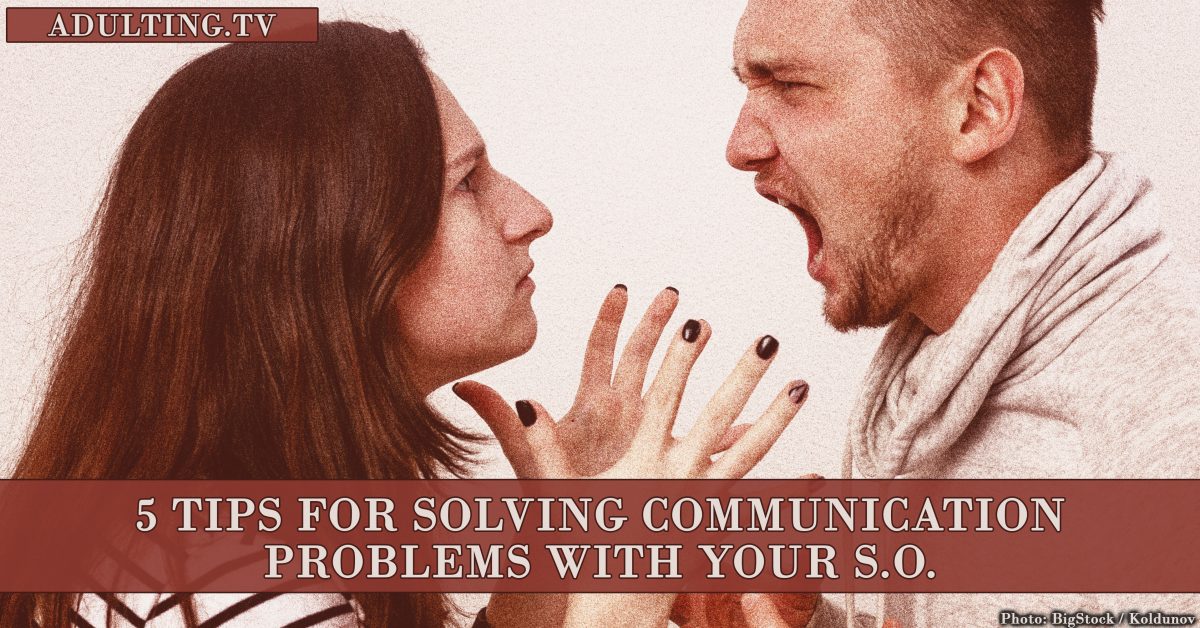Relationships are all about communication.
Deep bonds don’t form from nothing. They’re a result of a continuing exchange of ideas, emotions, and synergistic thinking. Even people who don’t share a common language can find ways to meaningfully interact.
If communicating is central to forming relationships, why is it so damn hard? The fact is, human minds are so unique that finding common ground can be like putting together a puzzle without a picture of the finished product.
That’s why long-term relationships are so special. When you spend enough time with someone, you can start to see how your personalities fit together harmoniously – or not so harmoniously. Sometimes you can see that the puzzle pieces fit, but struggle to put them together.
Ready to get beyond the drama? Here are some ideas for solving communication problems with your significant other.
Aim to understand.
One of the most frustrating moments in a fight is when one or both people aren’t listening to the other. It’s impossible to solve a disagreement if you’re not trying to see your partner’s point of view.
Your goal during an argument should be to understand your partner better and find some common ground. Learning how your partner thinks and feels is the key to a closer bond.
Too often, we treat the situation as if the goal is winning. Once you’re in that mindset, you both end up losers.
Solution: When your partner is talking during a fight, concentrate on what they’re saying and not how you want to respond. No matter how inane or illogical you think their argument is, try to listen before you say anything.
Let your guard down.
Getting defensive is a natural response if your partner brings up a difficult topic.
Does anyone really feel comfortable discussing something difficult, even with the person they love?
But defensiveness can close you off from the conversation. Instead of hearing what your partner is saying, you’ll only hear your skewed interpretation of what they really mean. If your husband tells you, “You forgot to take out the trash again,” you might hear, “You’re so irresponsible and don’t do enough around the house.”
Solution: Don’t project your own feelings onto what your partner is saying. It’s not fair to assume you know what they’re saying, and it can only lead to more discord.
When your partner is talking, listen to only what they’re saying. Get away from what you’re feeling. If you need to, repeat it back to them so you clearly understand. Then, calmly respond to the statement they made or question they asked.
Don’t use “all or nothing” language.
When trying to win an argument, you want to present the strongest case possible. But you have to stick to the facts. If you exaggerate or overstate something, it’s hard for the other person to take you seriously.
It’s also unfair to generalize your partner’s behavior as all-around bad. Behavior exists on a gray spectrum, and living in a black-and-white world during a fight reduces their actions to a trope.
Plus, you shouldn’t be trying to “win” anyway. This should be an exchange of ideas with the intent to understand.
Solution: Don’t use words like “always” and “never” in an argument. It’s easy for your significant other to argue against that, because there’s always an exception. Those types of words can and will make them make feel defensive.
Solving communication problems is about helping each other understand, not forcing each other into semantic battles.
Don’t wait until the last minute.
Communicating with your significant other is like taking out the trash. If you wait until the bag is overfilled, it’s harder to get it out the container. You find yourself wishing you’d dealt with it sooner.
When you get upset at your partner, bring it up that day. If you wait, the issue can fester and rot like the trash in my analogy. The sooner you broach the issue, the less upset you’ll be.
Solution: Bringing problems is hard to do and easy to avoid. Practice saying something beforehand so you feel more confident in your message.
You can try writing a script before you talk to your partner, or ask a friend how you could better phrase the issue. After doing this a few times, you’ll see that mentioning something in the beginning is much easier than waiting until you’re ready to explode.
Avoid name-calling.
Some people assume it doesn’t matter what they say in the heat of the moment as long as they apologize for it later. But apologies are like knee replacements: they temporarily fix the problem but don’t erase the damage.
Name-calling can be tempting when you’re in a screaming match, but doing so can lead to hurt feelings and resentment that isn’t so temporary. Your partner might never really forget the day you called her a stupid bitch.
This does nothing when it comes to solving communication problems.
Solution: If staying cool during a fight is too hard, take a walk alone and collect your thoughts. If your partner name-calls, don’t try to one up their comment. Use that moment to explain that you don’t appreciate what they said, or find it helpful.
It’s never easy to work through these issues. However, if you want a better relationship, solving communication problems with your partner is vital. Otherwise, you end up in a situation where you end up with someone you hate — or you break up to get away from the problems.






